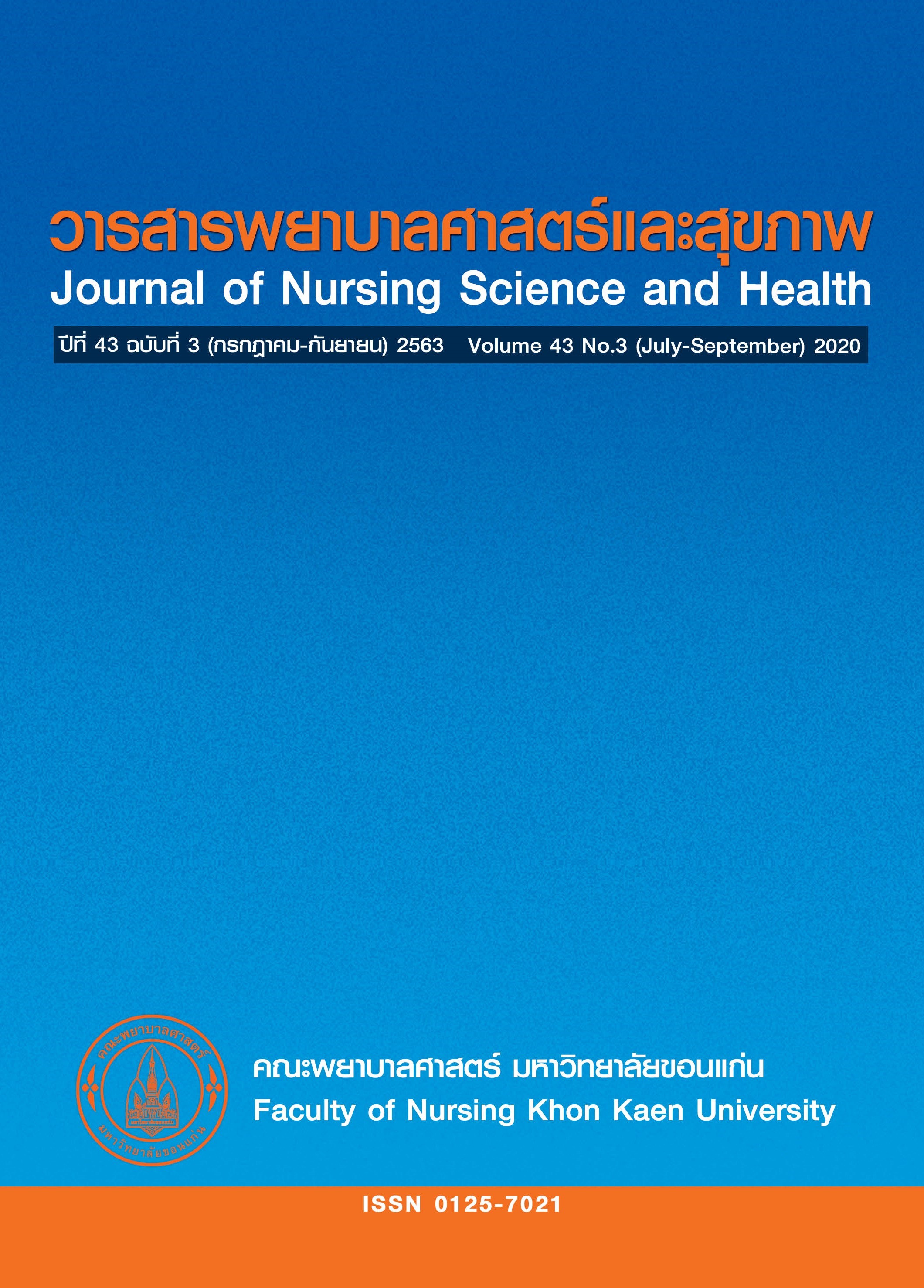ปัจจัยทำนายอาการนอนไม่หลับในผู้ป่วยหัวใจล้มเหลว
คำสำคัญ:
ปัจจัยทำนาย, นอนไม่หลับ, ผู้ป่วยหัวใจล้มเหลวบทคัดย่อ
การวิจัยเชิงทำนายครั้งนี้มีวัตถุประสงค์เพื่อศึกษาอาการนอนไม่หลับและอำนาจการทำนายของภาวะตื่นตัวทางกาย ภาวะตื่นตัวทางการรู้คิด การรับรู้การเจ็บป่วย การขยายเวลาในการนอน การงีบหลับตอนกลางวัน กับอาการนอนไม่หลับในผู้ป่วยหัวใจล้มเหลว กลุ่มตัวอย่างคือ ผู้ป่วยหัวใจล้มเหลวที่มาติดตามการรักษาที่คลินิกโรคหัวใจ จำนวน 80 ราย ณ โรงพยาบาลตติยภูมิแห่งหนึ่งในเขตกรุงเทพมหานคร เก็บรวบรวมข้อมูลด้วยแบบสอบถามข้อมูลส่วนบุคคล แบบบันทึกข้อมูลภาวะหัวใจล้มเหลว แบบสอบถามการนอนหลับ แบบประเมินภาวะตื่นตัวก่อนนอนหลับ แบบสอบถามการรับรู้ความเจ็บป่วยและแบบประเมินอาการนอน ไม่หลับ วิเคราะห์ข้อมูลโดยใช้สถิติเชิงพรรณนาและการวิเคราะห์ถดถอยพหุคูณ ผลการวิจัยพบว่ากลุ่มตัวอย่างมีอาการนอนไม่หลับระดับปานกลางถึงรุนแรงร้อยละ 30 ผู้ที่มีอาการนอนไม่หลับส่วนใหญ่ (ร้อยละ 97.5) มีอาการนอนไม่หลับร่วมกันทั้ง 3 อาการ (เริ่มต้นนอนหลับยาก นอนหลับไม่ต่อเนื่อง และตื่นเช้ากว่าปกติ) ภาวะตื่นตัวทางกาย ภาวะตื่นตัวทางการรู้คิด การรับรู้การเจ็บป่วย การขยายเวลาในการนอนและการงีบหลับตอนกลางวันสามารถร่วมกันทำนายอาการนอนไม่หลับในผู้ป่วยหัวใจล้มเหลวได้ร้อยละ 35.4 (R2=.354, p=.0001) โดยภาวะตื่นตัวทางการรู้คิดและการรับรู้การเจ็บป่วยเป็นปัจจัยทำนายอาการนอนไม่หลับในผู้ป่วยหัวใจล้มเหลว (β= .378, p=.0001 และ .341, p=.001 ตามลำดับ)
เอกสารอ้างอิง
Brostrom A, Johansson P. Sleep disturbances in patients with chronic heart failure and their holistic consequences-what different care actions can be implemented?. Eur J Cardiovasc Nurs 2005;4(3):183-97.
Chimluang J, Aungsuroch Y, Jitpanya C. Descriptors of insomnia among patients with heart failure. J Med Assoc Thai 2017;100(4):403-9.
Gau F-Y, Chen X-P, Wu H-Y, Lin M-L, Chao Y-FC. Sleep-related predictors of quality of life in the elderly versus younger heart failure patients: a questionnaire survey. Int J Nurs Stud 2011; 48(4):419-28.
Príncipe-Rodríguez K, Strohl KP, Hadziefendic S, Piña IL. Sleep symptoms and clinical markers of illness in patients with heart failure. Sleep Breath 2005;9(3):127-33.
National Institutes of Health. National Institutes of Health State of the Science conference statement on manifestations and management of chronic insomnia in adults, June 13-15. Sleep 2005;28(9):1049-57.
Andrews LK, Coviello J, Hurley E, Rose L, Redeker NS. "I'd eat a bucket of nails if you told me it would help me sleep: Perceptions of insomnia and its treatment in patients with stable heart failure. Heart & Lung 2013;42(5):339-45.
Tang L, Liu W, Yang Y, Han W, Li K. Relationship between sleep and cognitive function in patients with heart failure: A systematic review. J Psychosom Res 2020;130: 1-7.
Hayes D, Anstead MI, Ho J, Phillips BA. Insomnia and chronic heart failure. Heart Fail Rev 2008;14(3):171-82.
Javaheri S. Sleep dysfunction in heart failure. Curr Treat Options Neurol 2008; 10(5): 323-35.
Glovinsky P, Spielman A. The insomnia answer. New York: Penguin Group; 2006.
Karnchanakomate J, Pinyopasakul W, Ayuthya. KN, Sriprasong S. Factors predicting quality of sleep in patients with heart failure. Thai J. Cardio-Thorac Nurs 2014;25(2): 49-61. (in Thai)
Riegel B, Glaser D, Richards K, Sayers SL, Marzolf A, Weintraub WS, et al. Modifiable factors associated with sleep dysfunction in adults with heart failure. Eur J Cardiovasc Nurs 2011;11(4):402–09.
Redeker NS, Conley S, Anderson G, Cline J, Andrews L, Mohsenin V, et al. Effects of cognitive behavioral therapy for insomnia on sleep, symptoms, stress, and autonomic function among patients with heart failure. Behav sleep Med 2020;18(2):190-202.
Redeker NS, Knies AK, Hollenbeak C, Klar Yaggi H, Cline J, Andrews L, et al. Cognitive behavioral therapy for insomnia in stable heart failure: Protocol for a randomized controlled trial. Contemp Clin Trials 2017;55:16-23.
Choojit K, Jitpanya C, Chimluang J. The effect of sleep behavioral modification program on insomnia in heart failure patients. JRTAN 2018;19:184-92. (in Thai)
Guder G, Bauersachs J, Frantz S, Weismann D, Allolio B, Ertl G, et al. Complementary and incremental mortality risk prediction by cortisol and aldosterone in chronic heart failure. Circulation 2007;115(13):1754.
Pereg D, Chan J, Russell E, Berlin T, Mosseri M, Seabrook JA, et al. Cortisol and testosterone in hair as biological markers of systolic heart failure. Psychoneuroendocrinology 2013; 38(12): 2875-82.
Yamaji M, Tsutamoto T, Kawahara C, Nishiyama K, Yamamoto T, Fujii M, et al. Serum cortisol as a useful predictor of cardiac events in patients with chronic heart failure. The Impact of Oxidative Stress. Circ Heart Fail 2009; 2(6): 608-15.
Chirapongse J, Sunthornchaiya R. Factors related to insomnia among elderly patients with major depressive disorder. JPNMH 2018; 32(1): 134-49. (in Thai)
Wongkuan D. Factors predicting sleep disturbances in acute myocardial infarction survivors [thesis]. Bangkok: Chulalongkorn Univ; 2017. (in Thai)
Owens JF, Buysse DJ, Hall M, Kamarck TW, Lee L, Strollo PJ, et al. Napping, nighttime sleep, and cardiovascular risk factors in mid-life adults. J Clin Sleep Med 2010;6(4): 330-35.
Faul F, Erdfelder E, Buchner A, Lang A-G. Statistical power analyses using G*Power 3.1: Tests for correlation and regression analyses. Behavior Research Methods 2009;41(4): 1149-60. doi:10.3758/BRM.41.4.1149
Chen HM, Clark AP, Tsai LM, Chao YFC. Self-reported sleep disturbance of patients with heart failure in Taiwan. Nurs Res 2009;58(1):63-71.
Nicassio PM, Mendlowitz DR, Fussell JJ, Petras L. The phenomenology of the pre-sleep state: The development of the pre-sleep arousal scale. Behav Res Ther 1985;23(3): 263-71.
Kanjanawasee S. Applied statistics for behavioral research. 7th ed. Bangkok: cupress; 2012. (in Thai)
Broadbent E, Petrie KJ, Main J, Weinman J. The brief illness perception questionnaire. J Psychosom Res 2006;60(6):631-37.
Thepphawan P, Watthnakitkrileart D, Pongthavornkamol K, Dumavibhat C. Cognitive representation, emotional responses and hospitalization experience in predicting decision making for receiving treatment among patients with acute coronary syndrome. J Nurs Sci 2011;29(2):111-19. (in Thai)
Morin CM. Insomnia: psychological assessment and management. New York: Guilford Press; 1993.
Keawphang P. Relationships between selected factors and insomnia in adult cancer Patients [thesis]. Bangkok: Chulalongkorn Univ; 2004. (in Thai)
Kalmbach DA, Cuamatzi-Castelan AS, Tonnu CV, Tran KM, Anderson JR, Roth T, et al. Hyperarousal and sleep reactivity in insomnia: current insights. Nat Sci Sleep 2018;10:193-201.
Spiegelhalder K, Regen W, Feige B, Hirscher V, Unbehaun T, Nissen C, et al. Sleep-related arousal versus general cognitive arousal in primary insomnia. J Clin Sleep Med 2012; 8(4):431-37.
Aunjitsakul W, Udomratn P. Cognitive behavioral therapy for insomnia (CBT-I). The J Psychiatr Assoc Thailand 2016;61(1):89-106. (in Thai)
Tubtimtes S, Sukying C, Prueksaritanond S. Sleep problems in out-patient of primary care unit. J Med Assoc Thai 2009;92(2):273-78. (in Thai)
Riemann D, Spiegelhalder K, Feige B, Voderholzer U, Berger M, Perlis M, et al. The hyperarousal model of insomnia: a review of the concept and its evidence. Sleep Med Rev 2010;14(1):19-31.
Inamdar AA, Inamdar AC. Heart failure: diagnosis, management and utilization. J Clin Med 2016;5(7):62.
ดาวน์โหลด
เผยแพร่แล้ว
รูปแบบการอ้างอิง
ฉบับ
ประเภทบทความ
สัญญาอนุญาต
วารสารพยาบาลศาสตร์และสุขภาพเป็นเจ้าของลิขสิทธิ์ในการเผยแพร่ผลงานที่ตีพิมพ์ห้ามผู้ใดนำบทความที่ได้รับการตีพิมพ์ในวารสารพยาบาลศาสตร์และสุขภาพไปเผยแพร่ในลักษณะต่าง ๆ ดังนี้ การนำบทความไปเผยแพร่ออนไลน์ การถ่ายเอกสารบทความเพื่อกิจกรรมที่ไม่ใช่การเรียนการสอน การส่งบทความไปตีพิมพ์เผยแพร่ที่อื่น ยกเว้นเสียแต่ได้รับอนุญาตจากวารสารพยาบาลศาสตร์และสุขภาพ



